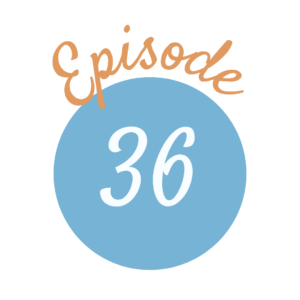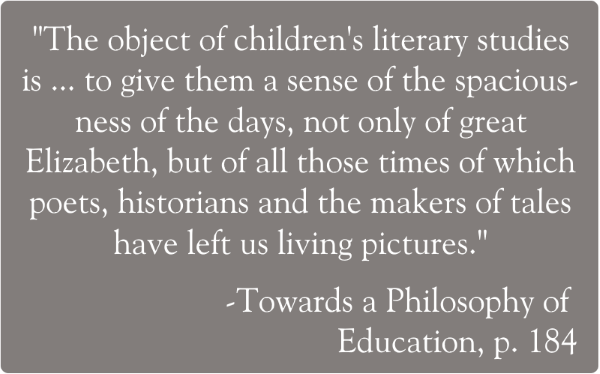
This week’s podcast focuses on Charlotte Mason’s ideas for the study of literature. Wait, isn’t every subject literature with her use of living books? How does the study of literature fit into her curriculum from the earliest age?
Listen Now:
“Except in Form I the study of Literature goes pari passu with that of History.” (Vol. 6, p. 180)
“It is a nice question whether the history of a country makes its literature or its literature the history!” R.A. Pennethorne, Parent’s Review, Volume 10, 1899, p. 549
“To adapt a phrase of Matthew Arnold’s concerning religion,––education should aim at giving knowledge ‘touched with emotion.'” (Vol. 3, p. 220)
“I know you may bring a horse to the water, but you cannot make him drink. What I complain of is that we do not bring our horse to the water. We give him miserable little text-books, mere compendiums of facts, which he is to learn off and say and produce at an examination; or we give him various knowledge in the form of warm diluents, prepared by his teacher with perhaps some grains of living thought to the gallon. And all the time we have books, books teeming with ideas fresh from the minds of thinkers upon every subject to which we can wish to introduce children.” (Vol. 3, p. 171)
“The ‘hundred best books for the schoolroom’ may be put down on a list, but not by me. I venture to propose one or two principles in the matter of school-books, and shall leave the far more difficult part, the application of those principles, to the reader. For example, I think we owe it to children to let them dig their knowledge, of whatever subject, for themselves out of the fit book; and this for two reasons: What a child digs for is his own possession; what is poured into his ear, like the idle song of a pleasant singer, floats out as lightly as it came in, and is rarely assimilated. I do not mean to say that the lecture and the oral lesson are without their uses; but these uses are, to give impulse and to order knowledge; and not to convey knowledge, or to afford us that part of our education which comes of fit knowledge, fitly given.” (Vol. 3, p. 177)
If you would like to study along with us, here are some passages from The Home Education Series and other Parent’s Review articles that would be helpful for this episode’s topic. You may also read the series online here, or get the free Kindle version from Fisher Academy.
Home Education, Part V, Chapter VIII
School Education, Chapters XV and XXI
Towards a Philosophy of Education, Book I, Section II (b)
English Literature for Boys and Girls
Five Years of Children’s Literature
(Contains affiliate links)



















Someone on the podcast mentioned reading To Kill a Mockingbird as a family read aloud. Can I ask the ages of the children involved? I would love to read this aloud with my teens, but I am a little leary of the subject matter with my 8 and 10 year olds. WOuld love to know how you handled this in your family!
Ladybute,
I believe I read the book at age 10 or 11 myself, and did have a son read it at nine with his older brother of 14. They listened to it on audio–maybe five times in a row? I don't know the foundation of literature your eight-year-old has had, but if you have read extensively, it is probably a fine choice. The adult themes are tastefully written about and most young children miss the implications and just enjoy Scout's antics, but only you as the mother can make the call. I think every child should read this book, but only you can decide whether now is the time for the youngest, and it is hard to leave one out of a family read-aloud book.
-Liz
So I am very much a math and science girl and this is a weak area for me. I have a 3rd grader, would you recommend a book or website to find literature appropriate for him. We are reading through Pilgrim's Progress. Thanks so much!
Do you have any book suggestions for 2nd grade mythology?
We really like A Wonder Book and Tanglewood Tales by Hawthorne, or D'Aulaire's Book of Greek Myths.
Awesome! Thank you so much for being willing to share your wisdom, knowledge, and light with us! I feel the Holy Spirit confirming the truths that you share every time I listen to your podcasts. Our family will be blessed for generations because of the years of work you four (Miss Mason included), have been willing to put into teaching us.
Sorry I have another question. I am having a hard time with finding the right Pilgrims Progress edition. Any suggestions? I don't want an abridged version, but there are some editions that say that it's been "lightly edited" and some of the words have been updated.
This is one we have and like.
THANK YOU!
Suggestions for the English Literature survey book for high school Literature?
I just wanted to comment for those on a budget or, like me, waiting on a book to be shipped, "English Literature for Boys and Girls" can be found on the Baldwin Project for free.
I will have a Form IA (2nd) and Form IIB (4th) next year and I am working on incorporating more of Charlotte Mason’s approach. I listened to this podcast yesterday, but have a question or two. Is this to be books chosen by the children and read aloud? This section, Tales, is form specific, correct? Therefore, Form IA should have Pilgrim’s Progress and Mythology read to her? Form IIB should read to herself for Literature, reading? If you could clarify, that would be great.
Rachel,
You are correct about the literature for school lessons for form Ia, “tales.” and form II has much more literature. They both share mythology in common. Form II especially focuses on the child perfecting the skill of reading by reading aloud with correct pronunciation and suitable expression. The books were chosen for the child, suitable novels, Shakespeare. The amount read independently (whether aloud or silently) is, of course, dependent on the child’s ability. You might be interested in the curriculum templates we offer on our website to help you plan appropriately. I hope your coming year is fruitful and joyful work as you incorporate Mason’s ideas and practices in your homeschool.
Liz